
14 minute read
STRATEGIC FLEET
CALL FOR STRATEGIC FLEET TO RIDE OUT GLOBAL SHOCKWAVES
The global pandemic has exposed dangerous gaps in Australia’s supply chain and demonstrates the need for urgent reform of Australian shipping, Maritime Union National Secretary Paddy Crumlin told the public hearing of the Senate Standing Committee on Rural and Regional Affairs in September.
“There’s nothing good about COVID,” said Crumlin. “But it has starkly demonstrated the abrogation of responsibility to regulate our critical shipping industry by state and particularly federal regulators.”
The national secretary said this not only put Australia’s public health at risk, but also, in the longer run, national security and the economy.
“Australia was caught unprepared for the COVID-19 pandemic,” he said. “This global crisis (is) highlighting the urgent need to reduce Australia’s dependency on foreign shipping in both domestic and international trade.”
Crumlin stressed that in the postCOVID recovery phase our economic,
social and political futures depended on taking back the coastal supply chain and crewing our blue highway with Australian seafarers.
Cabotage policy remains central to any reform, according to the union. Cabotage applies to over 100 countries in the world, it is not the exception to the rule; it is the rule.
The key recommendation of the union submission was Australian seafarers crewing a core fleet of fuel tankers and large trading vessels carrying essential goods, both domestically and internationally.
This was a platform Labor took to the federal election in 2018.
Investing in shipping, said Crumlin, was like investing in port infrastructure or pipelines.
“As the number of Australiancrewed vessels declines, not only are quality jobs lost, but our country is left vulnerable to global shocks that can disrupt maritime trade,” he said.
These concerns were backed by Air Vice- Marshal John Blackburn (retired), Chair of the Institute for
Integrated Economic Research, Australia.
“Ships are almost like the blood running through the arteries in your body,” he told the Senate committee. “At the heart of a national security strategy there should be a maritime trade strategy that also, of course, addresses Australian shipping. Today in Australia neither a national security strategy nor trade strategy exists.”
Blackburn highlighted how 98% of all Australian trade by volume is by sea.
“What would be the impact on the Australian way of life if these supply chains were interrupted even for a few weeks?” he asked. “Would we be prepared for the consequences, given that, for example, we import 90% of our fuels, 90% of our medicines?”
Blackburn also warned of the growing risk of regional conflict.
“(This) cannot simply be allayed by the fundamental assumption that we make in Australia that our security is assured by the US alliance,” he said.
“Whilst the relationship with the US people and the US military is strong, the behaviour of the US administration over the past three years means that we would be fools to not consider the possibility that the US either could not or may not be our security guarantee against an aggressor in the future.” Blackburn advocated a ‘smart sovereignty model’. This would mean having core Australian owned or controlled capabilities, Australian based manufacturing supply chains and a skilled workforce.
Complete self-reliance was unnecessary, he stressed. But Australia needs to have capabilities for crisis and a strategic fleet would be a key component.
Australia was now almost completely dependent on foreign owned shipping with only four Australian flagged ships of 2,000 tonnes and above capable of international trade. Fuel, iron ore, bauxite, aluminium, cement, construction materials, sugar and container imports were almost 100% transported in foreign ships.
Seventeen Australian cargo ships and 544 seafarer jobs have been lost since the election of the Abbott Government in 2013.
The union proposes a strategic fleet to include petroleum product tankers, dry bulk commodity ships, container ships, emergency towage vessel, emergency response ships, research and supply vessel, offshore wind installation and maintenance ships, training ships and auxiliary Navy vessels – all crewed by Australian seafarers. As a first step Australia should: • reduce its dependence on foreign shipping for essential goods and high-risk cargoes like ammonium nitrate and fuel • strengthen the Coastal Trading
Act to ensure that it actually supports Australian vessels • support a domestic cruise sector • acquire Australian ships to service renewable energy, like offshore wind.
In closing Crumlin lamented how countless union submissions in support of Australian shipping over the decades had largely gone ignored.
“It feels a bit like the Wailing Wall in Jerusalem,” said Crumlin. “You pray for a better world. But I’m not wailing; all I’m doing is bashing my head against a brick wall.”
The hope is that in the light of a global crisis governments may see the light. •
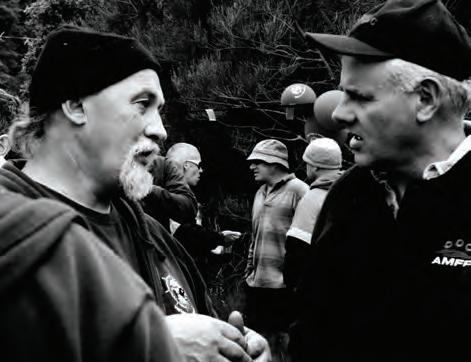
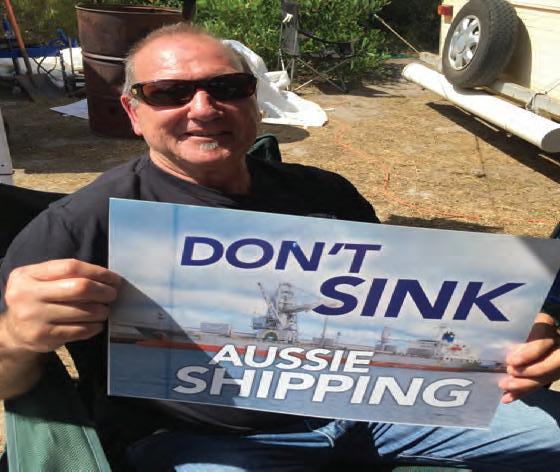

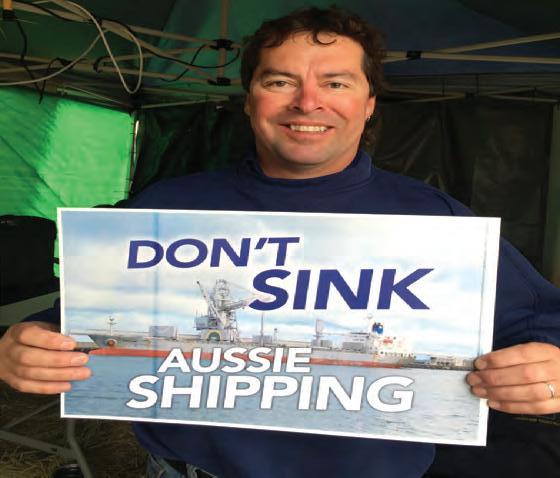
PORTLAND CREW COURT VICTORY
Ten Australian seafarers who took a stand over the loss of their ship in Portland in 2015 won an important court victory in August. The crew of the MV Portland were facing fines of between $800-$60,000 each for the two month long sit-in that ended with security guards escorting them off their ship in the dead of night and replacing them with foreign seafarers. The Australian seafarers were protesting a company decision to replace the ship with a flag of convenience vessel crewed by exploited international workers on the Australian coast.
The Fair Work Ombudsman took the matter to the Federal Court, alleging unlawful industrial action and prosecuting the union for damages on behalf of the company. The MUA argued the vessel was not trading at the time of the protest, and, after a five and a half year legal battle, won. “This is a significant victory for the 10 brave Australian seafarers who spent two months on board this vessel, without pay, in an effort to defend one of the few remaining Australian-registered vessels trading on our coast,” said Assistant National Secretary Ian Bray. “The only way multi-national companies like Alcoa have been able to get away with slashing the jobs of Australian seafarers is because the Federal Government continues to support this race to the bottom by court action and the issuing temporary licenses to use foreign vessels with exploited crews on coastal shipping routes.” •
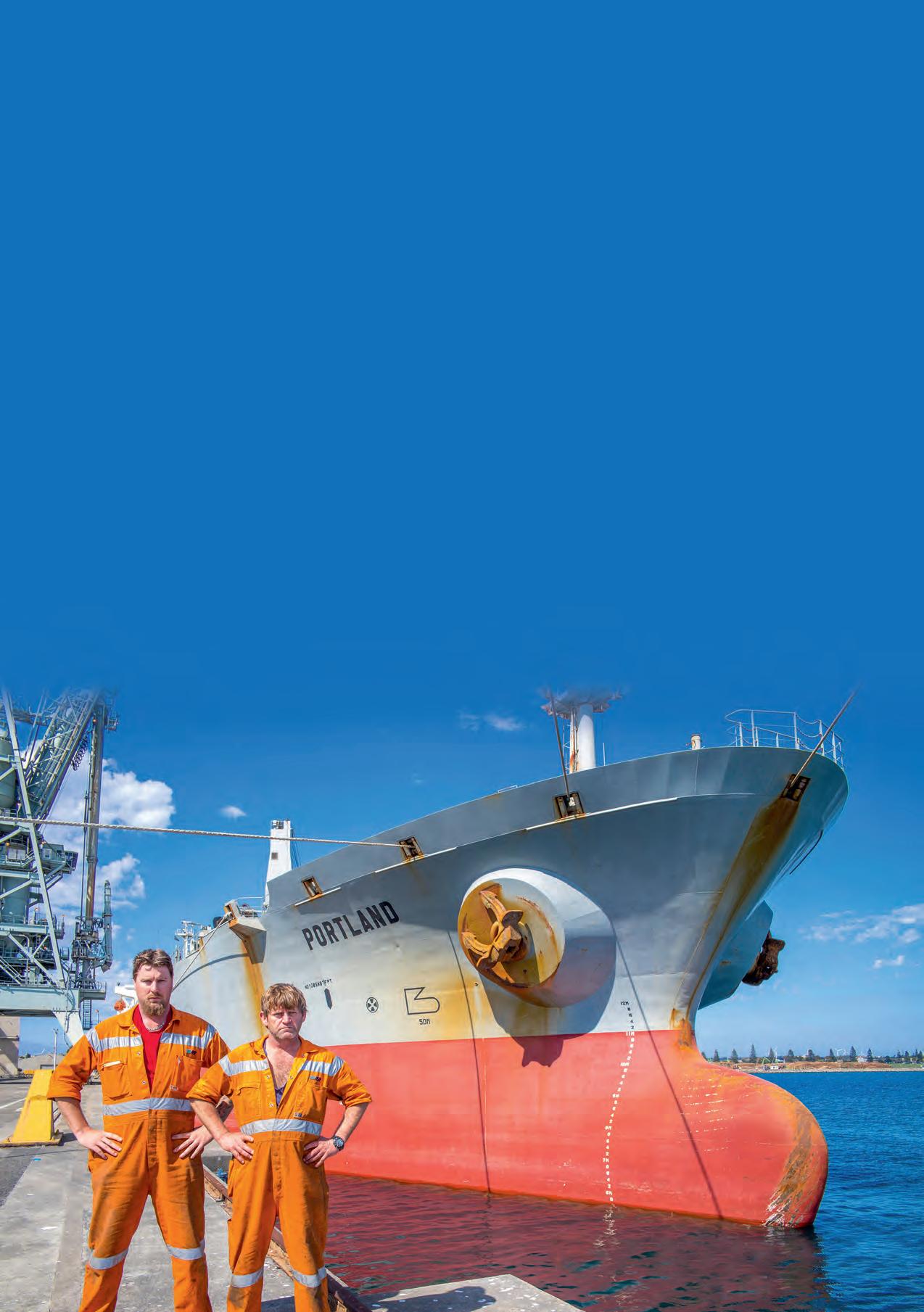
CREW VISA SCAM Open slather on the Australian coast opens doors for organised crime
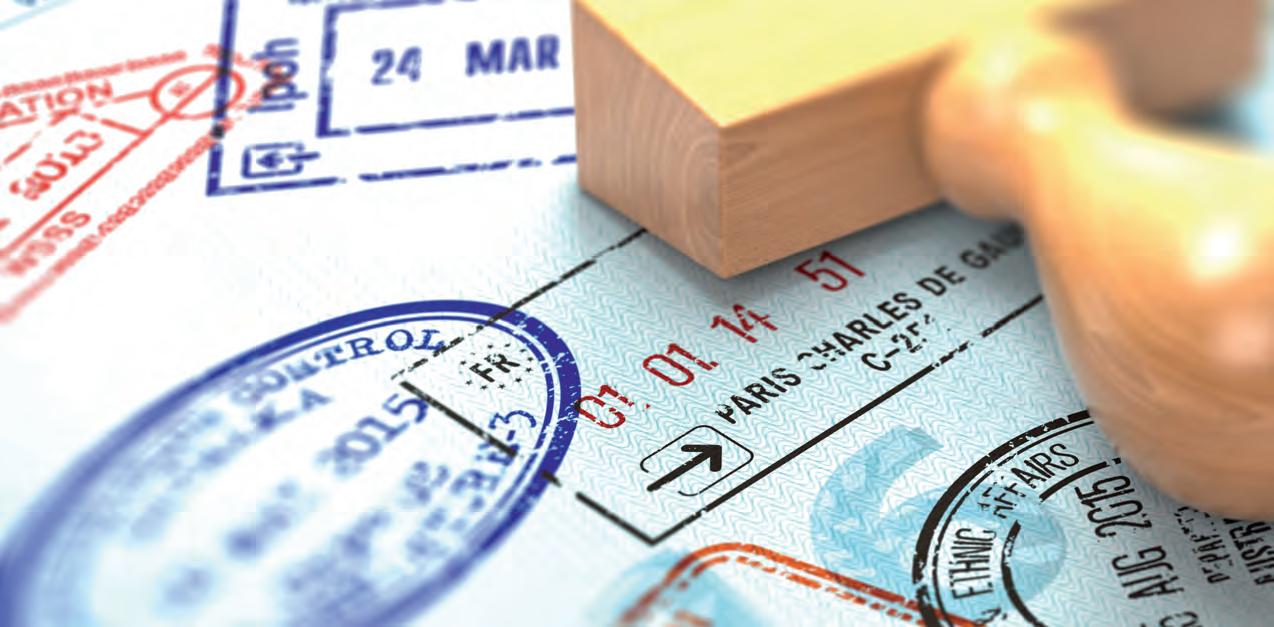
Maritime crew visas are being used to smuggle illegal immigrants into Australia – further exposing the dangers of deregulation of the coastal trade under successive conservative governments.
Organised crime syndicates are selling maritime crew visas (MCVs) on the black market for up to $10,000 each, the Sydney Daily Telegraph reported.
Australian embassies in India, Sri Lanka and elsewhere have posted warnings about scams involving fake MCVs on their websites.
MUA National Secretary Paddy Crumlin raised the issue at a hearing of the Senate Standing Committee on Rural and Regional Affairs in September.
“There’s no control over maritime crew visas,” he said. “They’re going for $10,000 each on the black market.”
Subclass 988 MCVs are provided to crew on foreign ships given temporary licences to trade on the Australian coast.
It is a transit visa designed for seafarers on international ships that are only in a port for short periods during loading and unloading operations as part of an international voyage.
Up to 300,000 different foreign seafarers from many nations have been employed on the 17,000plus Temporary Licence voyages undertaken since the Act commenced on 1 July, 2012.
No checks whatsoever are undertaken on their qualifications, their immunisation record or health status, the union warned.
In times of a global pandemic this also creates a major biosecurity risk.
Crumlin said the lack of government scrutiny when issuing the MCVs was a travesty.
“It is dangerous and it belies the fact that risk mitigation lies at the heart of good governance in this country,” he said.
“Wage slavery is going on out there, incarceration is going on out
“There’s no control over maritime crew visas. They’re going for $10,000 each on the black market.” – Paddy Crumlin
there—and temporary licences. The blind eye that is being turned to that is right at the heart of that negligence. I would suggest to you that, if it wasn’t the government, it is almost criminal negligence, because there is much organised crime.”
Addressing the Senate committee, Dean Summers, Australia Coordinator of the International Transport Workers’ Federation said that while there was a government approval process for MCVs there were no checks.
“Effectively, the company puts a crew list through the machine,” he said. “It goes through to Border Force. They say, ‘Yes, all of this crew can have maritime crew visas for three years.’ That takes about 24 or maybe 48 hours. Ours (clearance for Australian seafarers) take three to four months sometimes. It’s just crazy.”
The union is calling for a review of the temporary licence for foreign vessels to trade on the Australian coast and a total review of maritime crew visas.
The Telegraph said MCVs can be obtained online from outside Australia and they allow holders to enter and leave Australia multiple times over a three-year period if they arrive by sea.
MCVs also cover the partner or dependent child of a foreign crew member travelling with them, the paper said.
It reported that in the past three years Home Affairs cancelled 103 MCVs suspected of being fraudulent.
A Senate Inquiry into Flag of Convenience Shipping in July 2017 found FOC posed a serious risk to national security.
An Australian Border Force Submission to the inquiry said FOC registration regulation and practice offered features that organised crime syndicates or terrorist groups may seek to exploit. The Senate report stated: “The committee maintains that [FOC] vessels present serious security risks to the Australian coast, which need to be properly addressed.
Its recommendations were ignored. •
CREW
In what has become a global humanitarian crisis, 400,000 seafarers have become hostage to state border closures and restrictions preventing them going home.
It is a pandemic impasse that unions and industry warn could also spill over into environmental catastrophe and disrupt world trade.
“We now have seafarers on board ships for 12, 14, 16 months and, we’re now hearing examples, 18 months,” Dean Summers. Australia Co-ordinator International Transport Workers’ Federation told the public hearing of the Senate Standing Committee on Rural and Regional Affairs in September.
Fatigue is behind the many of the world’s biggest shipping calamities and oil spills – the Exxon Valdez, Shen Neng 1 on the Great Barrier Reef and now reports it was a factor with the MV Wakashio spill off Mauritius.
Summers warned fatigue was right 400,000 seafarers trapped on ships worldwide sparks humanitarian crisis and threatens environmental and economic calamity

through the industry and a maritime casualty could cost billions of dollars.
Over-contract crew could also bring world trade to a standstill, Summers warned.
“Say you stop one of those ships—and when I say ‘stop’, I mean: seafarers have the right, after the end of their contract, be that three months or nine months – to simply stop working. The ship can’t sail if it falls below minimum safe manning,” Summers said.
“You don’t have to look into a crystal ball; the consequences are obvious to everybody,” he said. “If ships stop, for whatever reason, then our economy stops, very, very quickly behind them.”
Australia’s multi-billion-dollar exports of iron ore out of the Pilbara or coal out of Northern Queensland could be affected, he warned.
A ship with below minimum safe manning in Port Hedland or Dampier or Hay Point would simply stop – its hold full of coal or ore going nowhere.
No one can force seafarers to work beyond their contracts. It is against international law.
According to the Maritime Labour Convention, seafarers have the right to be repatriated and port states have the obligation to facilitate their going home.
Summers chided the big industry players like the resource sector for simply going into their shells.
“It’s a very big concern for the industry, but they’re doing nothing about it,” he said. “They don’t want anybody on or off (the ships); they don’t want anybody into or out of their terminals. So, they’re just hoping it’s going to miraculously go away and international seafarers won’t complain anymore, but the opposite is true,” he said.
“Even if we had a vaccine and COVID was cured tomorrow, it would still take months and months to clear away the backlog.”
By that time shipping will have seafarers who had been close to two
– DEAN SUMMERS
years without stepping foot off a ship. “The ramifications for human rights are obvious, and the ramifications for our industry and our economy are huge,” said Summers.
The ITF, the International Maritime Organisation, the International Labor Organisation and the International Chamber of Shipping are calling on nations to act to resolve the global emergency.
On World Maritime Day 24 September 2020, United Nations Secretary General Antonio Guterres renewed his appeal to governments to address the plight of stranded seafarers by formally designating them as “key workers” and ensuring safe crew changes.
The IMO has established a Seafarer Crisis Action Team that includes the ITF and the ICS. It is working with governments at a diplomatic level.
But when governments like the UK initiated a virtual summit for shipping nations to discuss how to resolve the issue, Australia was conspicuously absent.
On 9 July 2020, 13 shipping nations signed the Joint Statement of the International Maritime Virtual Summit on Crew Changes, pledging to facilitate crew changes and achieve key status designation for seafarers.
“It was immediately apparent to the world that Australia just didn’t care or wasn’t engaged in this terrible issue. So that’s a big concern for us,” said Summers.
Since then another 40 nations have signed up. But not Australia.
Paddy Crumlin, who is the president of the ITF and also the national secretary of the Maritime Union of Australia wrote formally to the Prime Minister.
The letter calls on government to establish and fund a dedicated task force to coordinate state and federal government agencies, and work with the aviation sector to facilitate flights for seafarers’ repatriation. Crumlin called on government to adopt the IMO crew change protocol.
There has been no response to Crumlin’s appeal. Crew change is still left to individual states to tackle. At a national level a vacuum remains.
“Federally there’s nothing proactive,” said Summers. “Nobody has engaged our neighbours, the Philippines, India and Sri Lanka—those countries that provide labour for the flag-ofconvenience ships and the industry. Nobody has engaged the international aviation market to try to organise flights for seafarers to come and go.”
The WA state government continues to call for crew change to be confined to Singapore. But Pilbara Ports Authority which hosts the world’s largest iron ore export port, is attempting to establish a crew change centre, where seafarers can fly in and out of Port Hedland international terminal.
Maritime Safety Queensland has already adopted the process on a smaller scale. Crew changes are coming in and out of Brisbane at the rate of around 1,000 a month.
“It’s not going to make much of a dent on the 400,000 figure,” said Summers. “But it gives industry hope, it gives seafarers hope and it gives us somewhere to channel seafarers and companies who want a crew change.”
Summers said the shipping industry in Australia know what is going on and are standing shoulder to shoulder with the ITF.
When international unions from around the world contact his office and ask what they can do to help their members stuck on ships on the Australian coast, Summers can only advise: “You can go to Brisbane. Maybe there’ll be something in Western Australia soon. Divert your ships as best as you can into Singapore.”
While everybody knows the problem, the people who should be taking responsibility are sitting on their hands, he said.
Meanwhile Australia has ships trading around the coast with fatigued officers and exhausted crews who have no way of getting off.
A Kiribati seafarer contacted Summers from an Australian National Line chartered vessel trading between New Zealand and Australia after 17 months on board.
“They desperately in need to come off,” he said. “The matter is dire; the circumstances are urgent, and we’ve got to do something about it before seafarers are hurt and the industry is hurt too.” •






